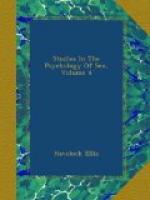[24] Emile Yung, “Le Sens Olfactif de l’Escargot (Helix Pomata),” Archives de Psychologie, November, 1903.
[25] The sensitiveness of smell in man generally exceeds that of chemical reaction or even of spectral analysis; see Passy, L’Annee Psychologique, second year, 1895, p. 380.
II.
Rise of the Study of Olfaction—Cloquet—Zwaardemaker—The
Theory of
Smell—The Classification of Odors—The
Special Characteristics of
Olfactory Sensation in Man—Smell as the
Sense of Imagination—Odors as
Nervous Stimulants—Vasomotor and Muscular
Effects—Odorous Substances as
Drugs.
During the eighteenth century a great impetus was given to the physiological and psychological study of the senses by the philosophical doctrines of Locke and the English school generally which then prevailed in Europe. These thinkers had emphasized the immense importance of the information derived through the senses in building up the intellect, so that the study of all the sensory channels assumed a significance which it had never possessed before. The olfactory sense fully shared in the impetus thus given to sensory investigation. At the beginning of the nineteenth century a distinguished French physician, Hippolyte Cloquet, a disciple of Cabanis, devoted himself more especially to this subject. After publishing in 1815 a preliminary work, he issued in 1821 his Osphresiologie, ou Traite des odeurs, du sens et des organes de l’Olfaction, a complete monograph on the anatomy, physiology, psychology, and pathology of the olfactory organ and its functions, and a work that may still be consulted with profit, if indeed it can even yet be said to be at every point superseded. After Cloquet’s time the study of the sense of smell seems to have fallen into some degree of discredit. For more than half a century no important progress was made in this field. Serious investigators seemed to have become shy of the primitive senses generally, and the subject of smell was mainly left to those interested in “curious” subjects. Many interesting observations were, however, incidentally made; thus Laycock, who was a pioneer in so many by-paths of psychology and anthropology, showed a special interest in the olfactory sense, and frequently touched on it in his Nervous Diseases of Women and elsewhere. The writer who more than any other has in recent years restored the study of the sense of smell from a by-path to its proper position as a highway for investigation is without doubt Professor Zwaardemaker, of Utrecht. The invention of his first olfactometer in 1888 and the appearance in 1895 of his great work Die Physiologie des Geruchs have served to give the physiology of the sense of smell an assured status and to open the way anew for much fruitful investigation, while a number of inquirers in many countries have had their attention directed to the elucidation of this sense.




